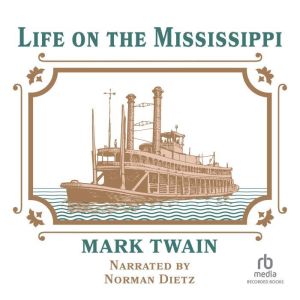

Life on the Mississippi
Author: Mark Twain
Narrator: Norman Dietz
Unabridged: 15 hr
Format: Digital Audiobook Download
Publisher: Recorded Books
Published: 07/07/1999


Author: Mark Twain
Narrator: Norman Dietz
Unabridged: 15 hr
Format: Digital Audiobook Download
Publisher: Recorded Books
Published: 07/07/1999
Mark Twain is the pseudonym of American writer and humorist Samuel Langhorne Clemens (1835-1910), whose best work is characterized by broad, often irreverent humor or biting social satire. Twain's writing is also known for realism of place and language, memorable characters, and hatred of hypocrisy and oppression.
Born in Florida, Missouri, Clemens moved with his family to Hannibal, Missouri, a port on the Mississippi River, when he was four years old. There he received a public school education. After the death of his father in 1847, Clemens was apprenticed to two Hannibal printers, and in 1851 he began setting type for and contributing sketches to his brother Orion's Hannibal Journal. Subsequently he worked as a printer in Keokuk, Iowa; New York City; Philadelphia, Pennsylvania; and other cities. Later, Clemens was a steamboat pilot on the Mississippi River until the American Civil War brought an end to travel on the river. In 1862 he became a reporter on the Territorial Enterprise in Virginia City, Nevada, and in 1863 he began signing his articles with the pseudonym Mark Twain, a Mississippi River phrase meaning "two fathoms deep."
In 1867 Twain lectured in New York City, and in the same year he visited Europe and Palestine. He wrote of these travels in The Innocents Abroad, a book exaggerating those aspects of European culture that impress American tourists. Much of Twain's best work was written in the 1870s and 1880s, when he was living in Hartford, Connecticut, or during the summers at Quarry Farm, near Elmira, New York. Roughing It recounts his early adventures as a miner and journalist; The Adventures of Tom Sawyer celebrates boyhood in a town on the Mississippi River; A Tramp Abroad describes a walking trip through the Black Forest of Germany and the Swiss Alps; Life on the Mississippi combines an autobiographical account of his experiences as a river pilot with a visit to the Mississippi nearly two decades after he left it; and A Connecticut Yankee in King Arthur's Court satirizes oppression in feudal England. The Adventures of Huckleberry Finn, the sequel to Tom Sawyer, is considered Twain's masterpiece.
Twain's work during the 1890s and the 1900s is marked by growing pessimism and bitterness. Significant works of this period are Pudd'nhead Wilson, a novel set in the South before the Civil War that criticizes racism by focusing on mistaken racial identities, and Personal Recollections of Joan of Arc, a sentimental biography.
In Twain's later years he wrote less, but he became a celebrity, frequently speaking out on public issues. He also came to be known for the white linen suit he always wore when making public appearances. Twain received an honorary doctorate from the University of Oxford in 1907. When he died he left an uncompleted autobiography, which was eventually edited by his secretary, Albert Bigelow Paine, and published in 1924.
I first read this book fifty years ago when I was in high school, and I recalled Twain's account of his days as a Mississippi steamboat pilot's apprentice as a work of great humor and style with quintessentially American themes, equal in power to Huckleberry Finn. A recent re-reading has left me bot......more
I really struggled with this one. It's a long wordy book that is basically about a river and nothing apart from the river. It's a very detailed account of said river. This wasn't what I was expecting at all, it is however another classic off the list!......more
My interest in this book waned as it devolved from the geography and history lessons which I founded very interesting, to being a boat pilot which went on too long, to storytelling of various characters which was variable, to travelogue to Native American mythology. I may be outgrowing Twain at this......more
And, mind you, emotions are among the toughest things in the world to manufacture out of whole cloth; it is easier to manufacture seven facts than one emotion. This is an awkward book to review, since it consists of so many, varied sections. Yet it can be neatly divided between the first third an......more